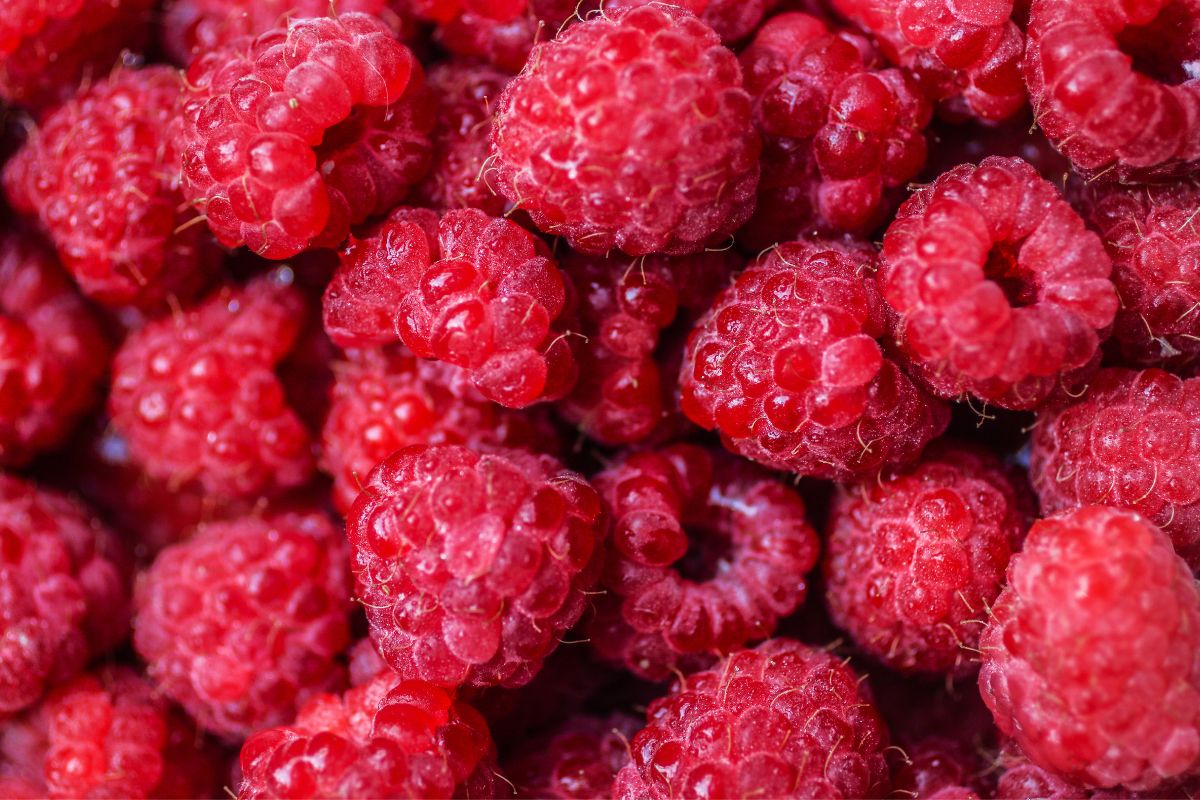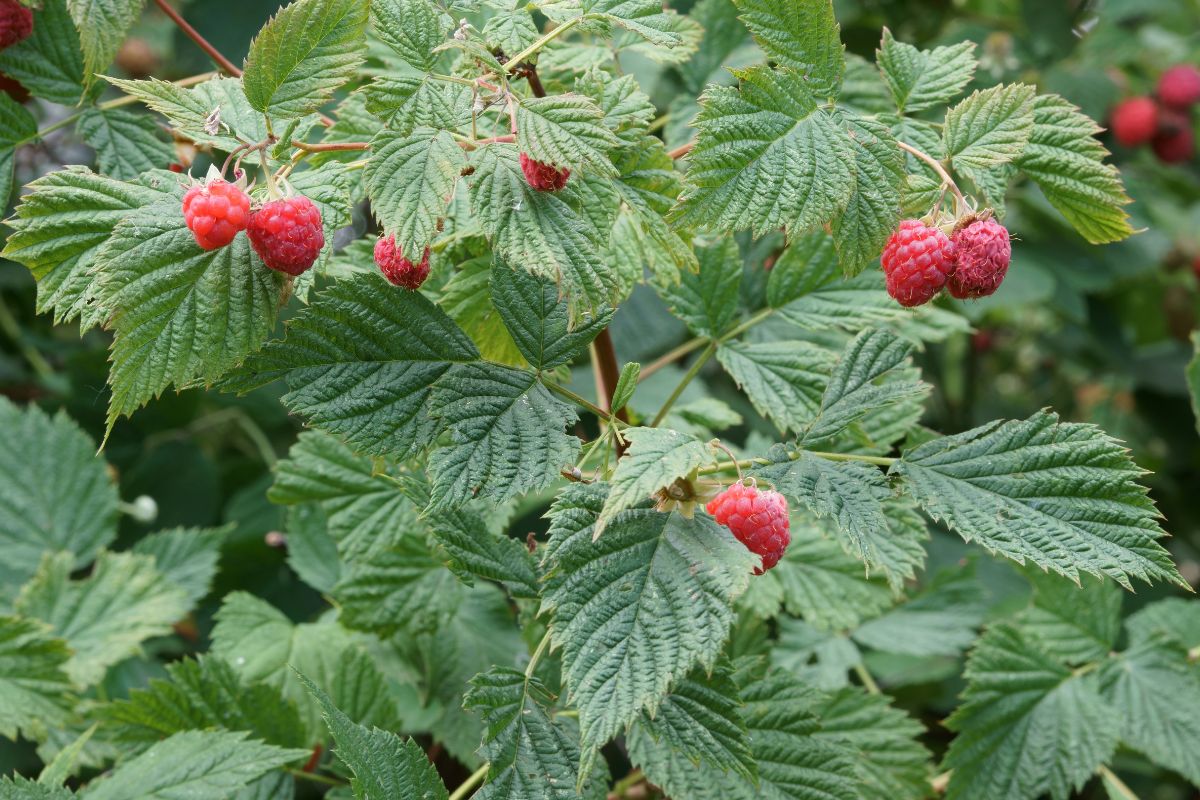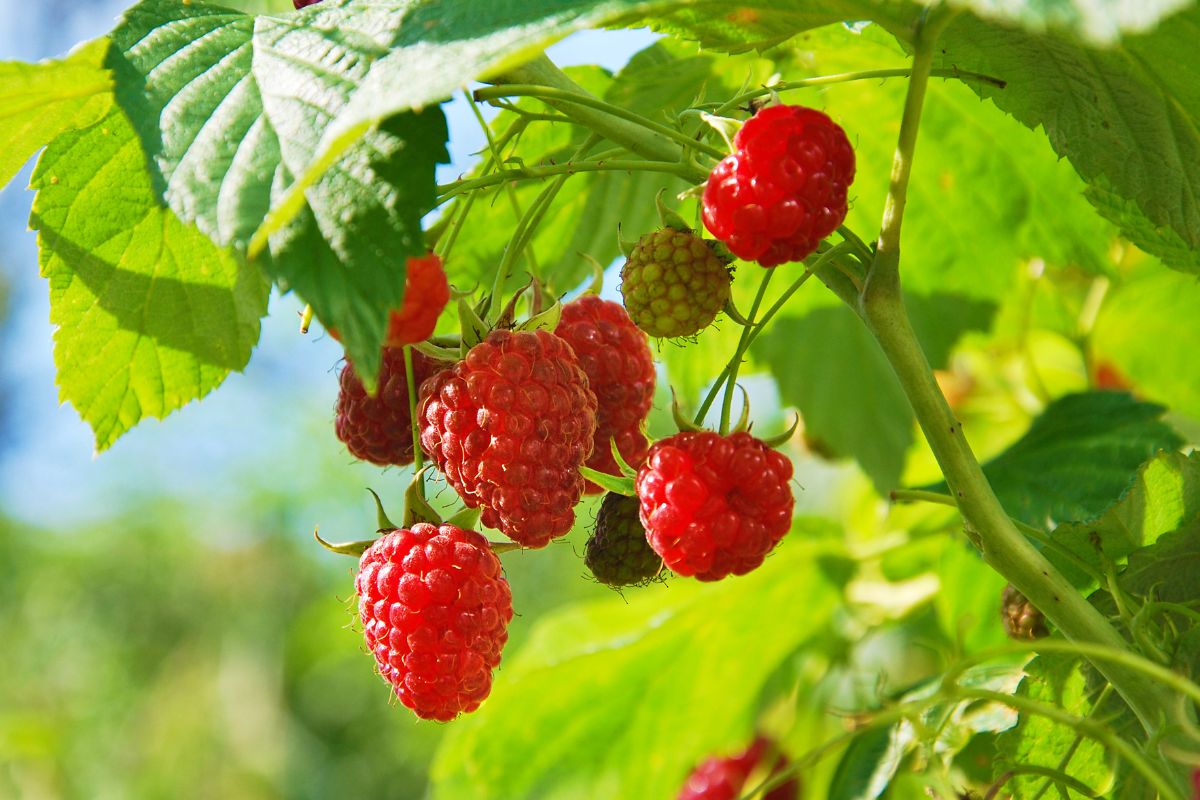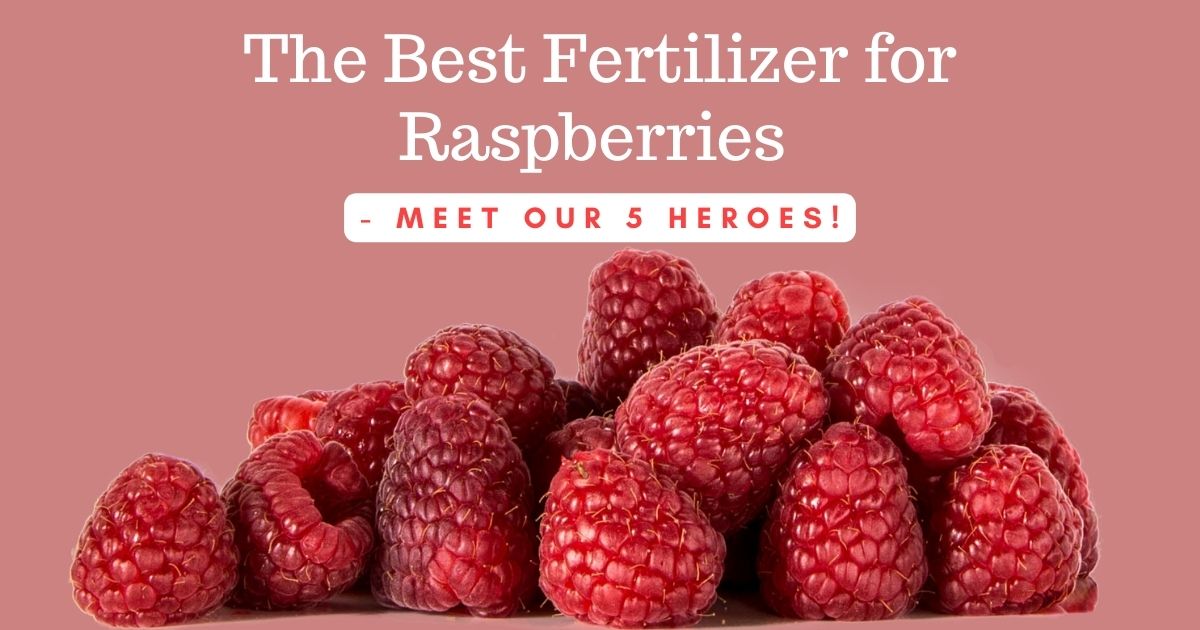Raspberry Fertilizer
The best fertilizers for raspberries have a lot of nitrogen (N). You can use a balanced fertilizer, such as NPK 10-10-10 fertilizer for raspberries. For each 10-feet (3.048 meters) row of raspberries in their first and second years of flowering, you should apply 8 ounces (226.8 grams) of nitrogen (N).
After the third year, you may use two times the quantity. Raspberry-growing soil should have a pH of 6.0 to 6.5.

When to Fertilizer Raspberries
Fertilizing in the Winter
Whether you use organic or artificial fertilizer, you may fertilize your raspberries just once in the winter. Since organic fertilizers take longer to release into the soil than inorganic fertilizers, early winter is the optimum time to utilize them. Use inorganic fertilizers in the late winter or early spring.
Apply 1.25 pounds (0.57 kilograms) of inorganic fertilizer per plant, spaced 12 inches (30.48 centimeters) from the raspberry, to meet the plant’s requirements for the entire year. For every 100 row feet (30.48 meters), you will require 25 pounds (11.3 kilograms) of organic fertilizer.
Seasonal Fertilization Throughout the Year
You can space out the fertilizer applications throughout the year if you neglect to apply a significant amount in the winter. Simply multiply the total amount of fertilizer you use in the wintertime by four. This is the quantity of organic or inorganic fertilizer that you should apply once in the spring, twice in the summer, and once more in the fall.
Do You Have to Fertilize Raspberries?
Fertilizing is a great technique to restore your soil’s nutrients, most frequently nitrogen. Nitrogen promotes the development of stems and green leaves, which nourish and stimulate future fruit development when your raspberry plants are in their fruit-bearing years. The soil benefits from spring tillage and summer mulching in addition to or instead of fertilizers.
You should test your soil before adding any fertilizers, and we highly recommend doing so. You can find native components required for raspberry plant development and growth in various concentrations in different soil types.
Make careful to pick a fertilizer that corrects the soil’s nutrient shortage if you test your soil and find that it lacks any essential nutrients (nitrogen, phosphate, potassium, etc.).
Our Raspberry Fertilizing Schedule
When you fertilize raspberries at the proper time of year, the plants flourish and produce delicious fruit. The greatest fertilizers provide results as soon as you insert your plants into the soil. The plants can realize their full potential with additional applications. Plants at least a year old respond well to berry fertilizer with a special design.
When adding the soil around the plant, well-rotted manure aids in fertilizing the ground. Nitrogen applications make plants flourish and enable them to develop to their full height. Nitrogen inputs, however, should cease once the plants start to bear fruit because the plant has to concentrate on generating fruit rather than foliage.
March sees growth. Avoiding fertilizer in the late spring or summer prevents plants from developing succulent late-season growth vulnerable to winter damage.
Why You Need a High–Quality Fertilizer
These three components are necessary for any plant to be healthy, just in various ratios, such as NPK. As seen in the illustration above, raspberries prefer higher levels of nitrogen and potassium for brilliant foliage and juicy fruit, with just the right quantity of phosphorus to keep the pH of the soil at a healthy level.
Raspberry plant fertilizer should be high in nitrogen, though balanced formulas are frequently advisable. For instance, 10-10-10 fertilizer or actual nitrogen at a rate of 4 to 5 pounds (1.8 to 2.3 kg) per 100 feet (30.48 meters) is the finest fertilizer for raspberry bushes (30.4 m.)
The Best Fertilizers for Raspberries at a Glance
| Product Name | Best for Case | List of Features |
| Espoma Organic Berry-tone 4-3-4 Natural & Organic Fertilizer and Plant Food for all Berries. Use for Planting & Feeding to Promote Bountiful Harvest | Best overall | -Formulated for increased fruiting and lush foliage -Includes six different types of beneficial bacteria |
| Ludicrous Nutrients Big Ass Berries Premium Berry Fertilizer Nutrients Indoor or Outdoor Works on All Berries | Best eco-friendly pick | -It is easy to use. Fertilize berries by mixing fertilizer with the soil lightly, or even a top dress sprinkle -Super nutrient berry fertilizer which contains all major nutrients |
| True Organic – Berry & Fruit Plant Food – CDFA, OMRI, for Organic Gardening | Best organic fertilizer | -Contains an extra 6% calcium & 1% sulfur to give your plants an additional nutrient blast -Unlike conventional fertilizers, true organic products replenish the soil, helping to restore the earth for future generations. |
| Down to Earth All Natural Acid Mix Fertilizer 4-3-6, | Best granular feed | -Blended for plants that thrive in a low pH soil -Specially formulated to encourage productive home orchards full of delicious and nutritious tree fruits now popular in many backyard gardens. |
| Jobe’s Organics, 09364, Soil Additive, Soil Acidifier, Brown | Best value for money | -No chemical runoff -No mixing or measuring -Will not burn plants when applied as directed |
Our Raspberry Fertilizer Shopping Guide
Element Content
The element content is significant for raspberries, although nitrogen is the most crucial component. Finding a high nitrogen concentration fertilizer is vital because nitrogen promotes growth and proper fruiting. Because berry shrubs thrive with them, berry fertilizers frequently have high potassium ratios.
The potassium has a pleasant taste and makes the berries even healthier to consume. The element ratios in berry fertilizers frequently look like this: 7-6-9. That works out perfectly as long as nitrogen ranks first or second. You should focus more on the nitrogen value because it always arrives first.
While it is always possible to purchase fertilizer, you would also suggest trying a DIY method. Using kitchen waste that you would otherwise discard, you may create fertilizer at home and have complete control over its composition.
Do You Need Pesticides?
Many gardeners ponder whether they require fertilizer that contains pesticides or herbicides, similar to what is available for lawns. Fortunately, raspberry plants often take care of themselves very well and don’t typically require chemical support. Keep a watch out for aphids on your raspberry leaves.
You may purchase ladybugs or praying mantises from your neighborhood garden center to eliminate any pest species you spot. Additionally, raspberries develop robust root systems that make it difficult for other plants to compete in their environment. Most of the time, neither weeding nor using a herbicide is necessary for raspberries.
To ensure your raspberry plants are receiving the proper balance of nutrition and acidity in your soil, you should conduct a soil test if you find that many plants are starting to compete with them.
Organic or Non-Organic Fertilizer?
Using raspberry fertilizer organic for raspberries is advisable because they are typically simpler to manage. They’re much less likely to harm if you mistakenly overfertilize your soil. Additionally, organic fertilizers usually pose less risk to pets and young children; however, you should always double-check because there is no assurance!
However, your raspberries are much more concerned with the quality of your fertilizer than with whether it is organic. You can use 100% naturally occurring nutrients to make organic fertilizers, which can come from both plant and animal sources. Non-organic fertilizers may contain synthetic chemicals made in a lab, frequently blended with some natural substances.
Which type of fertilizer you like is up to you as long as it is proper for raspberries. Your raspberry patch may harm the local ecosystem if you use a non-organic fertilizer, so make sure the label says it’s environmentally friendly.
Raspberry Fertilizer N-P-K Ratio
Knowing what raspberries require makes it simple to select the appropriate NPK. It includes a three-numbered formula on every fertilizer label. This number represents the product’s ratio of nitrogen, phosphorus, and potassium. A 4-3-4 NPK, for instance, comprises 4% nitrogen, 3% phosphorus, and 4% potassium (formulated for raspberries).
These three components are necessary for any plant to be healthy, just in various ratios, such as NPK. As seen in the illustration above, raspberries prefer higher levels of nitrogen and potassium for brilliant foliage and juicy fruit, with just the right quantity of phosphorus to keep the pH of the soil at a healthy level.
Nitrogen
By promoting the formation of chlorophyll, nitrogen plays a critical function in fostering the establishment of strong stems and colorful foliage. In addition to ensuring that photosynthesized energy is available to transform starches and carbs into food, this gives vegetation its characteristic green hue.
After that, the robust plant structure sustains and nourishes flowers and prodigious crops of luscious berries. The proteins and enzymes that control the intake and distribution of water and nutrients are also fed by this multipurpose macronutrient.
Phosphorus
Through the activation of stored energy to transform starches and carbs into food, phosphorus plays a critical part in photosynthesis. Phosphorus aids in the development of buds and fruit in other crops. But plants that thrive in acidic soil, like raspberries, aid in controlling soil pH. to make it simple for plants to get further essential nutrients.
Then, phosphorus enters the cellular level. They are helping to build the proteins and enzymes that nitrogen employs to control water and nutrients.
Potassium
The movement of water, minerals, and photosynthesized raspberry plant food throughout raspberry plants is courtesy of potassium. As a result, it stimulates 80 different phosphorus and nitrogen-based enzymes that encourage the development of buds, flowers, and fruits.
By assisting them in preserving moisture, potassium at the right levels helps raspberry plants fight disease, high heat, and drought. Moreover, it is particularly effective in promoting plant dormancy throughout even the coldest winters.
Controlled Release vs. Liquid Fertilizer
The best fertilizer for raspberries might be liquid or slow-release. Granules and spikes have a unique covering that permits the regulated release of nutrients and is highly concentrated. Depending on the temperature outside and the available moisture, these can endure for several months. Liquids provide effects more quickly, particularly in poor soil.
When administered as a spray, it transports nutrients straight to the leaves or roots, allowing quick absorption. You have better control over the frequency and amount of fertilization of your raspberries using liquids. However, they frequently call for more applications.
Effect of Soil PH on Raspberries
The pH range for raspberries in the soil is 5.6 to 6.2. You can see anything outside this range in your plants’ health. No matter how much you apply, if the level is too high, it stops the metabolism of nutrients.
Heavy metal ion poisoning may affect your raspberries if the concentration is too low. Over time, the healthiest way to increase acidity is by adding well-aged compost.

Reviewing our Top Raspberry Fertilizer Selections
Espoma Organic Berry-tone 4-3-4 Natural & Organic Fertilizer and Plant Food for All Berries. Use for Planting & Feeding to Promote Bountiful Harvest – Pack of 2: Best Overall
Amazon Choice Award in Garden Fertilizers by Espoma.
Item form: Powder
Item weight: 4 pounds (1.8 kilograms)
How to use the product: In the first and third months of spring, spread 1 cup per foot (0.3048 meters) of a branch for a slow-release feed that encourages brisk development and an abundance of fruit.
About This Product
Larger fruit and long-lasting, slow-release growth is ideal for organic farming. Perfect for all types of strawberries, raspberries, and blueberries. Grow bigger plants with more fruit using our special Bio-tone microorganisms, created in the USA. You should use all berries, including blueberries, strawberries, raspberries, and blackberries.
Berry-tone is a potent combination of the best organic and natural nutrients strengthened with the proprietary Bio-tone formula, a 4-3-4 fertilizer analysis with 5% sulfur. With no sludge or hazardous substances, it is safe for the environment. When growing new plants or feeding established ones, it works best to apply it twice a year, in early and late spring.
You don’t need to mix Berry-tone. It is ready to use. Berry-tone also has the go-ahead for use in organic farming; as registered organic input material, it satisfies all standards for organic production.
Pros
- Created to promote more fruiting and lush foliage
- Contains six distinct kinds of benevolent bacteria.
Cons
- It could produce an earthy odor.
Ludicrous Nutrients Big Ass Berries Premium Berry Fertilizer Nutrients Indoor or Outdoor Works on All Berries: Best Eco-Friendly Pick
Item form: Powder
Item weight: 1.5 Pounds (0.68 kilograms)
How to use the product: Mix lightly with the soil or top dress, although sprinkling will work.
About This Product
The wizards at Ludicrous Nutrients, who have over 40 years of fertilizer and nutrient experience, have done it again, this time in the form of a potent blend of proprietary super nutrients that help your strawberries, raspberries, blueberries, blackberries, and any berry reach their full potential.
It works with all berries, including cranberries, acai, boysenberries, huckleberries, mulberries, red and black currants, and more. This is one of the market’s only “berry-oriented” super nutrients.
This is the best fertilizer for berries and is on offer in 1.5 pounds (68 kg) pouches. To fill a container of 8 inches (20.32 centimeters) in diameter, 12 inches (30.48 centimeters) in diameter, or 16 inches (40.64 centimeters) in diameter, use half a scoop, one scoop (1 tablespoon), or 1.5 scoops.
Use one scoop per square foot (0.093 square meters) of ground or plant bed when applying fertilizer. Use 1.1 to 2.2 pounds (0.5 to 1kilogram) fertilizer per 53.8 square feet (5 square meters) for larger outdoor grows. Fertilizer can be lightly incorporated into the soil or applied as a “top dress.” Sprinkling, however, will also be effective.
Pros
- It is simple to apply. Sprinkle the fertilizer on top of the soil or lightly mix it with the soil to nourish berries.
- It functions on all berries.
- Super-nutritious berry fertilizer with all the essential nutrients
Cons
- The item can be pricey.
True Organic – Berry & Fruit Plant Food- CDFA, OMRI, for Organic Gardening: Best Organic Fertilizer
Item form: Granules
Item weight: 4 Pounds (1.8 kilograms)
How to use the product: For indoor plants, outdoor plants, raised garden beds, and plants in containers once a month.
About This Product
Farm-grade materials rooted in agriculture are now accessible to the home gardener from the industry leader in organic fertilizer production and brand trusted by the organic food sector! Their goal is to maximize the benefits of all organic products. For the past 17 years, they have worked to develop organic standards that will safeguard you and your family.
Numerous household companies, such as Earthbound Farm, Dole, Taylor Farms, Sunkist, Organic Girl, Driscoll’s, and many more, receive organic fertilizers from them. The Organic Materials Research Institute, or OMRI, has confirmed that all products are 100 percent organic.
They are the first maker of plant foods to have bureau veritas ISO 22000 certification, and their goods have extensive tests for infections. Their food safety management method generates a safer product for your food to be grown in. You can use their products in any soil or hydroponic growing environment, and they are compatible with any plant.
The market leader in organic fertilizer for food production is True Organic. True organic granular berry plant food provides the best start for your fruit and berry needs, which is an organic blend of all-natural plant foods with a 5-4-4 Formula. It will give your strawberries, raspberries, blueberries, and blackberries the superpowers to produce large, delicious fruits.
Along with an exclusive blend of tested farm-grade ingredients for plants, soil, and microbes, such as poultry manure, fish bone meal, potash, soybean meal, seabird guano, shrimp, and crab shell meal, it also contains an additional 6% calcium and 1% sulfur to give your plants an extra nutrient boost.
It provides the right balance of nitrogen, phosphorus, and potassium, encouraging lush green foliage, a profusion of flowers, and ample fruit. True Organic products, as opposed to conventional fertilizers, replenish the soil, aiding in the restoration of the planet for future generations and maintaining the organic status of your backyard ecosystem.
It is ideal to use it once a month on in-ground and container plants, including houseplants and raised garden beds for organic production.
Pros
- Adaptable to all types of plants
- It is a mixture of organic ingredients.
- Offers the right nutrition to support new growth
- You can use it for both container and in-ground plants.
Cons
- Could be pricey
Down to Earth All Natural Acid Mix Fertilizer 4-3-6, 5 Pounds: Best Granular Feed
Amazon Award Choice in Garden Fertilizers by Down To Earth
Item form: Granules
Item weight: 5 Pounds (2.27 kilograms)
How to use the product: Mix it into the top 3 inches (7.6 centimeters) of soil in the early spring for abundant foliage. Again, the buds form to ensure a healthy formation of the flower and fruit. After application, thoroughly rinse.
About This Product
The 5-pound (2.27 kilograms) package of the 4-3-6 formula Down to Earth’s All-Natural Acid Mix fertilizer is available. Its natural and mild character benefits the environment and the plants producing raspberries. Although it is costly, it offers more than you could anticipate. As it is a slow-release mixture, you should administer this fertilizer twice a year.
The plant and its roots have plenty of time to absorb all the micro and macronutrients adequately since it gradually enables all of its nutrients to seep into the soil. The Down to Earth’s All-Natural Acid Mix fertilizer, which you can only use twice a year, has won the title of “Most Convenient” on this list of feeds due to its simple handling.
You may also use an acidic mixture of the materials, which benefits the raspberry and other plants. In addition to facilitating the plant’s efficient uptake of minerals from the soil, acidic soil reduces the likelihood of infection and illness.
Typically, raspberry plants prefer soils with a pH of 5.0 to 6.5 (mildly acidic); this range aids in their better growth and abundant production of nutrient-rich fruits. This fertilizer accomplishes both tasks: it enriches the soil with nutrients. It keeps the environment acidic throughout the growing season.
Before purchasing this product, it is advisable to have your soil tested because it only functions best in neutral to alkaline soils. This fertilizer may further reduce pH if applied to already acidic soil, resulting in several issues. On the other hand, Down to Earth’s All-Natural Acid Mix fertilizer performs wonders in alkaline soils.
In contrast to a tiny, weak raspberry plant, it can be that one item you require to produce a healthy, fruitful harvest. Good nitrogen concentration in the Down to Earth’s All-Natural Acid Mix feed encourages flowering and fruiting.
This product also contains most of the necessary trace elements, like calcium and magnesium, which makes things much simpler for a home gardener.
With a 4-3-6 make, the fertilizer from Down to Earth’s All-Natural Acid Mix is a well-balanced product that contains nearly all the essential nutrients a raspberry plant requires for growth and fruiting. It is among the best products for alkaline soils and novice gardeners.
Pros
- Performs remarkably well in both neutral and alkaline soils
- Lowers the pH of the soil, facilitating absorption and reducing the risk of infection and disease.
- Has an excellent ratio of potassium, phosphorus, and nitrogen.
- Contains traces of elements
- Designed specifically for berries.
- Assists plants in maintaining a strong immune system
- Needed only twice each year
Cons
- Expensive item
- Incompatible with acidic soils
- Before applying this fertilizer, you must test the soil pH annually.
- May significantly reduce soil pH.
Jobe’s Organics, 09364, Soil Additive, Soil Acidifier, 6lbs, Brown: Best Value For Money Raspberry Fertilizer: Best Value For Money
Item form: Granules
Item weight: 6 Pounds (2.7 kilograms)
How to use the product: To maintain the optimum soil pH, apply during planting and reapply twice per year.
About This Product
Jobe’s Organics’ soil acidifier lowers the pH of the ground. It is carefully created with all-natural materials to give sulfur, a natural chemical used to balance alkaline soils, to plants that prefer an acidic environment. Use of this mixture is advisable for blueberries and hydrangeas. Jobe’s organic soil acidifier alters the soil’s pH, making hydrangeas turn a stunning blue.
Healthy soil is the basis for healthy plants. You may help your plants thrive in the ideal environment by adding Jobe’s organic soil additives to your soil. Before implementing any soil additions, we advise conducting a soil test.
Don’t forget to get Jobe’s Organics Garden Lime, Jobe’s Organics Bone Meal, Jobe’s Organic Blood Meal, Jobe’s Organic Sphagnum Peat moss, and Jobe’s Organic Perlite, and Jobe’s Organic Compost Starter. Your organic garden will prosper with Jobe’s Organics’ soil acidifier.
It is safe to use around kids and animals. It is a certified organic method that uses no synthetic chemicals and is OMRI rated by the USDA for organic agriculture. It encourages darker green development without any toxic chemicals that could burn the plant.
Pros
- Boosts microbial activity for healthy, productive soil
- Fully Organic
Cons
- Could emit an organic odor
FAQs on Fertilizer for Raspberries
How Do I Fertilize Raspberries?
Most raspberry fertilizers are dry granules that you water them in. Following application, quantities and frequencies vary by product. There are water-soluble and foliar spray fertilizers, but they’re rare. The three berry plant fertilizers above are dry, easy-to-apply chemicals.
If specialized berry fertilizer with a complete nutrient profile isn’t available, use fruit tree fertilizer, acid-loving flowering plant fertilizer, or an all-purpose fruit and vegetable garden fertilizer from a garden nursery. When possible, you can buy OMRI-listed organic items and evaluate nutrient sources.
Most all-purpose fertilizers help correct soil nutrient shortages. For best plant growth, apply fertilizer evenly and as directed. Over-fertilizing might hurt the plant and produce fewer tasty berries. Soil tests can indicate macronutrients and trace mineral deficits.
Soil testing can also reveal its pH level. Raspberries prefer 5.5-6.5 pH soil (slightly acidic soils). A soil test will tell you the amount of organic matter and amendment and fertilizer rates.

Summary
It doesn’t have to be difficult to grow your raspberries, and you shouldn’t have to be content with meager yields yearly. You may gather larger harvests and develop healthier plants with the aid of the raspberry fertilizer. Even though I already adore raspberries, nothing beats the flavor of ones picked right at home.
Naturally, you should get the soil tested before selecting a fertilizer if you want to acquire the best crop from your raspberry patch. In this manner, you can select the correct fertilizer that benefits your soil the most. Enjoy your garden!




